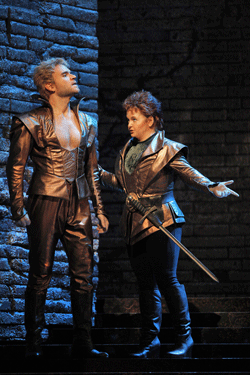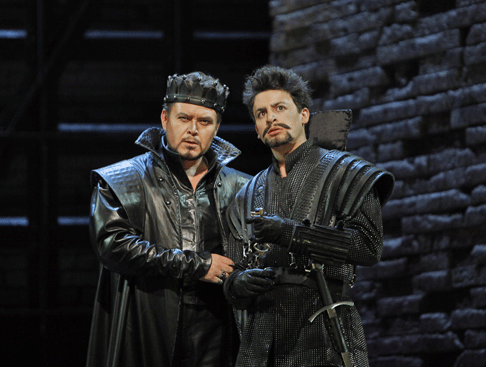Recently in Reviews
English Touring Opera are delighted to announce a season of lyric monodramas to tour nationally from October to December. The season features music for solo singer and piano by Argento, Britten, Tippett and Shostakovich with a bold and inventive approach to making opera during social distancing.
This tenth of ten Live from London concerts was in fact a recorded live performance from California. It was no less enjoyable for that, and it was also uplifting to learn that this wasn’t in fact the ‘last’ LfL event that we will be able to enjoy, courtesy of VOCES8 and their fellow vocal ensembles (more below …).
Ever since Wigmore Hall announced their superb series of autumn concerts, all streamed live and available free of charge, I’d been looking forward to this song recital by Ian Bostridge and Imogen Cooper.
The Sixteen continues its exploration of Henry Purcell’s Welcome Songs for Charles II. As with Robert King’s pioneering Purcell series begun over thirty years ago for Hyperion, Harry Christophers is recording two Welcome Songs per disc.
Although Stile Antico’s programme article for their Live from London recital introduced their selection from the many treasures of the English Renaissance in the context of the theological debates and upheavals of the Tudor and Elizabethan years, their performance was more evocative of private chamber music than of public liturgy.
In February this year, Albanian soprano Ermonela Jaho made a highly lauded debut recital at Wigmore Hall - a concert which both celebrated Opera Rara’s 50th anniversary and honoured the career of the Italian soprano Rosina Storchio (1872-1945), the star of verismo who created the title roles in Leoncavallo’s La bohème and Zazà, Mascagni’s Lodoletta and Puccini’s Madama Butterfly.
Evidently, face masks don’t stifle appreciative “Bravo!”s. And, reducing audience numbers doesn’t lower the volume of such acclamations. For, the audience at Wigmore Hall gave soprano Elizabeth Llewellyn and pianist Simon Lepper a greatly deserved warm reception and hearty response following this lunchtime recital of late-Romantic song.
Collapsology. Or, perhaps we should use the French word ‘Collapsologie’ because this is a transdisciplinary idea pretty much advocated by a series of French theorists - and apparently, mostly French theorists. It in essence focuses on the imminent collapse of modern society and all its layers - a series of escalating crises on a global scale: environmental, economic, geopolitical, governmental; the list is extensive.
For this week’s Live from London vocal recital we moved from the home of VOCES8, St Anne and St Agnes in the City of London, to Kings Place, where The Sixteen - who have been associate artists at the venue for some time - presented a programme of music and words bound together by the theme of ‘reflection’.
'Such is your divine Disposation that both you excellently understand, and royally entertaine the Exercise of Musicke.’
Amongst an avalanche of new Mahler recordings appearing at the moment (Das Lied von der Erde seems to be the most favoured, with three) this 1991 Mahler Second from the 2nd Kassel MahlerFest is one of the more interesting releases.
‘And there was war in heaven: Michael and his angels fought against the dragon; and the dragon fought and his angels, And prevailed not; neither was their place found any more in heaven … that old serpent … Satan, which deceiveth the whole world: he was cast out into the earth, and his angels were cast out with him.’
If there is one myth, it seems believed by some people today, that probably needs shattering it is that post-war recordings or performances of Wagner operas were always of exceptional quality. This 1949 Hamburg Tristan und Isolde is one of those recordings - though quite who is to blame for its many problems takes quite some unearthing.
There was never any doubt that the fifth of the twelve Met Stars Live in Concert broadcasts was going to be a palpably intense and vivid event, as well as a musically stunning and theatrically enervating experience.
‘Love’ was the theme for this Live from London performance by Apollo5. Given the complexity and diversity of that human emotion, and Apollo5’s reputation for versatility and diverse repertoire, ranging from Renaissance choral music to jazz, from contemporary classical works to popular song, it was no surprise that their programme spanned 500 years and several musical styles.
The Academy of St Martin in the Fields have titled their autumn series of eight concerts - which are taking place at 5pm and 7.30pm on two Saturdays each month at their home venue in Trafalgar Square, and being filmed for streaming the following Thursday - ‘re:connect’.
The London Symphony Orchestra opened their Autumn 2020 season with a homage to Oliver Knussen, who died at the age of 66 in July 2018. The programme traced a national musical lineage through the twentieth century, from Britten to Knussen, on to Mark-Anthony Turnage, and entwining the LSO and Rattle too.
With the Live from London digital vocal festival entering the second half of the series, the festival’s host, VOCES8, returned to their home at St Annes and St Agnes in the City of London to present a sequence of ‘Choral Dances’ - vocal music inspired by dance, embracing diverse genres from the Renaissance madrigal to swing jazz.
Just a few unison string wriggles from the opening of Mozart’s overture to Le nozze di Figaro are enough to make any opera-lover perch on the edge of their seat, in excited anticipation of the drama in music to come, so there could be no other curtain-raiser for this Gala Concert at the Royal Opera House, the latest instalment from ‘their House’ to ‘our houses’.
"Before the ending of the day, creator of all things, we pray that, with your accustomed mercy, you may watch over us."
Reviews
![Renée Fleming as Lucrezia Borgia [Photo by Cory Weaver courtesy of San Francisco Opera]](http://www.operatoday.com/LB_SFO1.gif)
28 Sep 2011
Lucrezia Borgia in San Francisco
Bad news travels fast. Though you are about to read another version of how American diva Renée Fleming failed to bring Lucrezia Borgia alive, let us begin by discussing a few other things you already know.
Venetian facades are marble, not brick, thus it takes more than blue light rippling on red brick walls to evoke Venice. Lucrezia’s new home Ferrara was not towering walls of Styrofoam bricks painted red, plus it is obvious that all of Lucrezia’s evil machinations did not occur in a strong, golden sunset sidelight.
Rolex is not spelled Borgia, even though the golden insignia that hung over the stage seemed to advertise luxury watches, and the B wrenched from the Borgia name (that somehow found itself inscribed on a tomb in Ferrara) was a dead ringer for the serifed first letter of Bulgari.
Amazingly Mme. Fleming’s second act, stupendously rich gown upstaged both red Styrofoam and gold gel (the transparent film that colors stage lights), and the ridiculousness of her third act soldier disguise (revealing ample décolletage under a bouffant wig) upstaged her maternal anguish (she had had to poison her son).
 Michael Fabiano as Gennaro and Elizabeth DeShong as Maffio Orsini
Michael Fabiano as Gennaro and Elizabeth DeShong as Maffio Orsini
Mme. Fleming has carefully nurtured the image of American artistic luxury. Her porcelain persona was everywhere evident on the War Memorial stage. Mme. Fleming is at the same time a very intelligent artist who possesses a unique talent and a beautiful voice. Perhaps if this production had presented her as a real person we might have perceived a full, beautifully voiced character of brutal mind and twisted integrity.
Donizetti and his librettist’s idea of Lucrezia Borgia is as a bel canto heroine — no matter how horrible a person she may be, and how terrible her circumstances become, the music must always be beautiful, her voice soaring gloriously. Bel canto titillates its acolytes (willing audiences) with this contradiction. In the artificial atmospheres of this production that set out solely to beautify Mme. Fleming she read as dramatically and vocally insipid. And, well, the opera is all about her.
Lucrezia Borgia boasts sensational subject matter beyond infanticide. Her son Gennaro has sworn eternal love to his friend Maffio Orsini, who is actually a girl because it is a pants role. So a guy loves a guy who is actually a girl. Unfortunately this production precluded any resulting sexual titillation by casting diminutive mezzo Elizabeth DeShong as Orsini who read as Gennaro’s belligerent baby sister.
Even so the B in bel canto did succeed somewhat in forcing its way into the theater. Italian conductor Riccardo Frizza provided a solidly idiomatic if uninspired reading of Donizetti’s score, perhaps in reaction to the production. American tenor Michael Fabiano gave great pleasure, as a singer he is stylish and correct as evidenced in his splendid “Di pescator ignobile," and he glowed as an accomplished actor in scenes with his no affect mother. Ukrainian bass Vitalij Kowaljow made a big impression as Lucrezia’s third husband, Alfonso d’Este, tearing up the stage with his showpiece "Vieni, la mia vendetta!"
 Vitalij Kowaljow as Duke Alfonso and Daniel Montenegro as Rustighello
Vitalij Kowaljow as Duke Alfonso and Daniel Montenegro as Rustighello
While Mlle. DeShong did not physically measure up to Orsini she proved herself to be a strong singer. Among the smaller roles the Rustighello of Adler Fellow Daniel Montenegro was effectively drawn.
The libretto by Felice Romano is undeserving of ridicule. It accomplishes what a bel canto libretto sets out to do — create situations that can only be resolved by beautiful singing. But Lucrezia Borgia is like a carefully constructed short story where there is not one word too many, and in fact Donizetti revised the opera several times so maybe there is not one note too many either. It is this stark minimalism that shunts this blunt opera from masterpiece status.
Stage direction, sets and costumes are all by English producer John Pascoe, a production he created for Mme. Fleming at the Washington Opera in 2008.
Michael Milenski
![Renée Fleming as Lucrezia Borgia [Photo by Cory Weaver courtesy of San Francisco Opera]](http://www.operatoday.com/LB_SFO1.gif)

